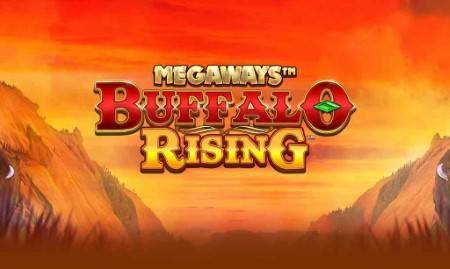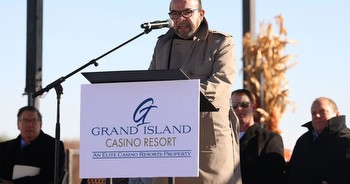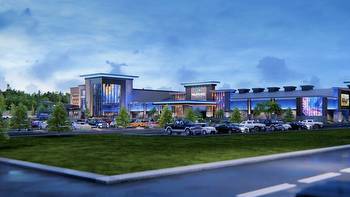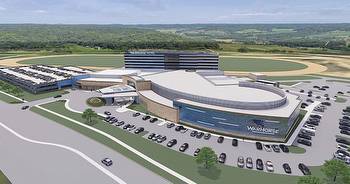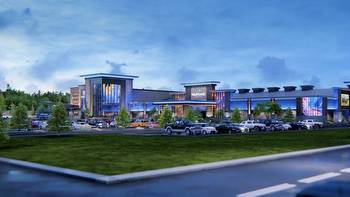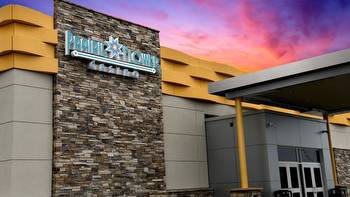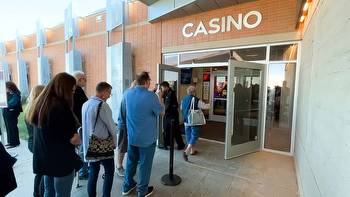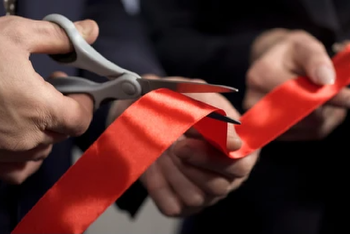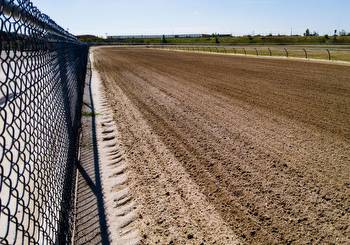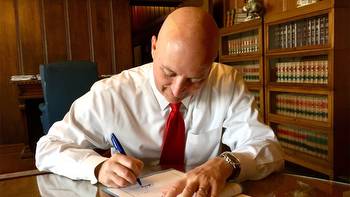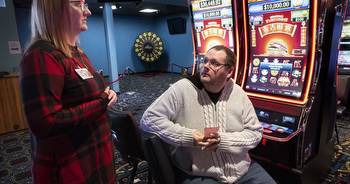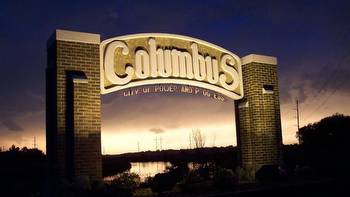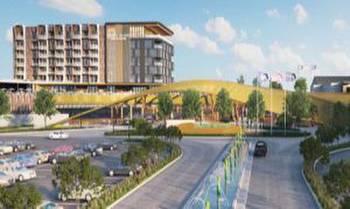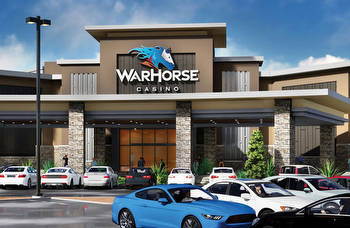Housing to Healthcare: New Casinos Could Help Winnebago Reservation Grow
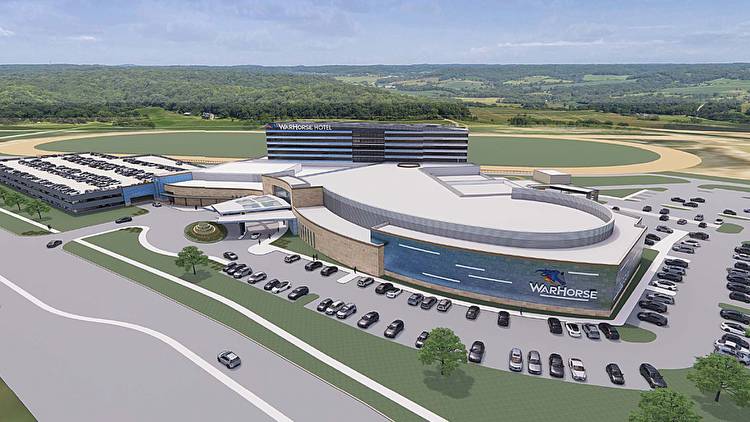
In the July heat during a casino groundbreaking in Omaha, Lance Morgan shook hands, said his thank yous, and met with each member of the media in attendance. One at a time, the Ho-Chunk Inc. CEO charmed each person with a joke or two.
“I'm a Husker fan and I'm a little annoyed with Iowa Hawkeyes right now,” Morgan explained why he wants to bring gaming revenue into Nebraska.
Ho-Chunk is the first Nebraska player in creating a comprehensive casino off reservation land.
Morgan expects the business’ profits to soar in the next five years. With this, there's an opportunity for life in Winnebago to improve more than it already has in recent memory.
The new gambling regulations were approved in May. WarHorse Gaming, owned by Ho-Chunk Inc., received its two gaming licenses and broke ground on a Lincoln casino in just two months following the rules’ approval. The Omaha racetrack-casino broke ground two weeks after that.
Despite that quick turnaround, Ho-Chunk Inc and Nebraska Horsemen have waited a long time for this moment.
The two organizations partnered to help get the gambling initiative on the 2020 election ballot. It passed that November. Ho-Chunk contributed a total of $6.6 million toward the campaign called “Keep the Money in Nebraska.”
The initiative received 65% voter approval. Now, any racetrack in Nebraska can legally add a full scale casino onto its existing grounds.
Ho-Chunk is the economic development corporation created by the Winnebago Tribe. The tribe is based in northeast Nebraska’s village of Winnebago. The reservation’s total population is 2,874 people, the 2020 census said.
Between the two racetrack-casinos, also known as “racinos,” Morgan expects gaming revenue to move from bordering Iowa casinos to Nebraska, resulting in robust growth in Ho-Chunk’s revenue.
Morgan said the two casinos will begin grossing about $150 to $180 million per year. Nebraskans are spending about $400 million per year at casinos in Iowa and other bordering states.
Where will those profits go?
To understand the business’ donations and reinvestments, let’s first understand Ho-Chunk Inc.’s inception.
The Indian Gaming Regulatory Act was signed into law in 1988. In 1992, the Winnebago Tribe built a full-scale casino in Sloan, Iowa, called “WinnaVegas.” Sloan is located on the reservation just a few miles east of the Nebraska border.
The Winnebago People had few economic opportunities before WinnaVegas was constructed.
In 1994, the tribe decided to create an economic development corporation from two years worth of WinnaVegas profits, called Ho-Chunk Inc.
Founded by Morgan, Ho-Chunk’s goal was originally to diversify the tribe’s investments away from gaming.
The move was sparked by casinos opening in nearby Council Bluffs, Iowa. Casinos in Iowa were cropping up, because of that state’s more lax gaming regulations.
The tribe realized gaming revenue wasn’t a long-term solution.
Instead, Ho-Chunk Inc. was focused on government contracting, construction, and selling the government office products. In 2021, contracting grossed $232 million for Ho-Chunk, according to its 2021 annual report.
At the Omaha groundbreaking, Morgan said he understands the irony of his company now building casinos, given the its founding purpose. Nonetheless, he said that money will return to the communities in need.
“These facilities in Omaha and Lincoln will approximately double the size of Ho-Chunk Inc., so it'll be about 50% (of the company’s revenue),” Morgan said.
“But the cash flow from them will not just stimulate the communities we're [building] in and our own community, but we'll reinvest it,” he said.
Morgan said each year Ho-Chunk Inc. must pay a dividend, or reinvestment, back to the Winnebago Tribe, which is about 25% per year.
“My job in our tribe is to make money, reinvest it, and then, a certain portion goes back to the tribe,” he said.
Last year, Ho-Chunk paid about $5 million in reinvestment to the tribe. Of that reinvestment – the tribe budgeted out about $3.7 million for their general fund. That’s used for tribe programs like Ho-Chunk language preservation, the annual homecoming celebration, healthcare and substance abuse services, and more.
The rest of that money gets used for housing, a down payment assistance program, and other community, federal, or private programs. That amount totaled about $1.3 million last year.
The Winnebago Reservation’s current poverty rate sits at 22% of Winnebago People living below the state poverty line, according to the 2020 census. A different census survey from 2000 indicated that number was higher.
Morgan said Ho-Chunk offers more opportunities to Winnebago People than were previously available.
“If you go back in time and look at Winnebago in the early ‘90s, it was one of the poorest towns in Nebraska,” he said. “And now we've got an entity. I think we will probably do about $400 million a year – non-gaming revenue.”
The business employs about 86 Winnebago tribe members living on the reservation and about 119 total Native American people total, their 2021 report states.
Once the casinos are established, Morgan said that Ho-Chunk will pay off their construction costs first. Morgan said that bill won’t be small.
“I know the combined cost in Omaha and Lincoln is going to be around $560 million,” Morgan said.
After construction costs are covered, Morgan said the company may continue its work to build more affordable housing in Winnebago.
Kenneth Grant of Winnebago and the Omaha Tribe said that he would appreciate more investment into affordable housing.
“Build everybody a house – a nice house,” he said.
In the past, Ho-Chunk worked with the tribe to develop the “Ho-Chunk Village.” It’s a 40-acre real estate development with 115 housing units, on the north end of Winnebago.
It includes single-family homes, multi-family homes, senior housing, apartments, and retail stores.
The housing program, administered by a third party nonprofit, helps cover initial down payments on a new house for families looking to buy. This allows Indigenous People to build wealth across generations, rather than living in subsidized government housing.
Kenneth Grant said he thinks the Ho-Chunk Village is a great idea now and moving forward.
“We're moving in a great direction,” he said. “...I love our town, love the way we're prospering.”
“You know, that’s not off casinos either, it’s just off just – hard work.”
Morgan said that Ho-Chunk currently has plans to develop another village he's calling Ho-Chunk Village 2.0.
He said there are historical challenges of land ownership and poverty that the tribe must overcome.
“What most people don't understand is that our land is held in trust. We don't have any tax revenue at all, hardly, as a tribal entity,” Morgan said. “So, we provide our social services through profits generated through our economic activity.”
Ho-Chunk had to buy land from a non-Native farmer to develop. They couldn’t purchase reservation land because of how it’s owned.
Reservation land is divided into small parcels for each member. On the Winnebago Reservation this means land ownership is broken up into extremely small chunks, especially after passing it down through generations. Ho-Chunk said it’s extremely hard to develop land when ownership is so widely disbursed.
Morgan said that Ho-Chunk continues to work to buy land for housing and agriculture for Winnebago People.
“What really gets our people excited is developing the community, bringing back some of the traditional agricultural products, taking back some of our land control – over our destiny.” he said.
Other than housing and land development, Ho-Chunk Inc. helped fund many other services in Winnebago outside of their dividend paid to the tribe, Morgan said. That includes but isn’t limited to education and health assistance.
“We handle things from early childhood education to health care to elder homes to college to tribal college to internships to housing programs,” Morgan said. “Everything you can think of, we're trying to do it.”
Ho-Chunk Inc. has helped construct athletic facilities for Winnebago Public School as well as community building and cultural causes, according to the Ho-Chunk site.
“We're going to build buildings and make investments, and we want to put facilities in North and South Omaha, too. And maybe help recruit, to train, to see what else we can do,” he said.
Morgan grew up in North Omaha and graduated from Omaha North High School. He said he aims to help Omaha communities in need.
Sharon Redhorn Chamberlain is the general manager of the Winnebago Gaming Commission, which owns two slots-only casinos on the reservation – Native Star Casino in Winnebago and IronHorse Casino in the village of Emerson.
The Native Star Casino has just about 50 slot machines. But, it does have a kitchen and gas station attached. Located in the small strip mall area on the south end of Winnebago down Highway 77, there’s also a laundromat and supermarket in the same building.
Redhorn Chamberlain said the Omaha and Lincoln casinos will bring in people from a different area.
“I really don't feel like the (casino) in Lincoln will impact us,” she said. “As far as our players – our players are all local, from the small towns surrounding us.”
She said location is just as important as the types of games a casino has.
“I think if they want to gamble, they're going to go wherever,” Redhorn Chamberlain said. “My customers – I think they're very loyal.”
At the end of the day, she noted that Ho-Chunk Inc. and the existing casinos in Winnebago are all a part of the same tribe with similar goals – to help the community grow.
Kenneth Grant from Winnebago and the Omaha Tribe visits the Native Star Casino in Winnebago on occasion.
Grant said, despite the long drive to Omaha, he wants to try out the new poker tables, once that facility is established.
“Yeah. I'll be down here,” Grant said. “My immediate family lives in Omaha, so I don't have a problem going down there and staying. But again, I'm not going to make a life out of it, either.”
Grant said he enjoys playing Texas Hold ‘Em – a traditional competitive poker game.
There are other concerns with the new casinos, however, especially considering more places will offer table games in the state.
Morgan said that there are systems in place to prevent people from falling into debt.
“(People can) become part of our frequent player cards,” he said. “We can see how they're doing, and people also can put their names on a list to not play anymore. It's like me with Hot Cheetos. I have to stop eating those.”
Casinos are prone to human trafficking, a security management publication said.
The Nebraska Racing and Gaming Commission, which regulates and monitors new casinos, is attempting to get ahead of the potential human rights problem. The commission will administer a training program for new gambling facilities. That training will be based off of suggestions from the Nebraska Human Trafficking Task Force. This according to the most updated set of casino rules signed into law this May.
Looking ahead, Ho-Chunk plans to build a third racetrack-casino in South Sioux City. Morgan said he wasn’t sure how long it would take to break ground and build on that location.
However, Ho-Chunk will have competition within the state. Caesars Entertainment out of Nevada has plans to build casinos in Grand Island and Columbus.
The city of Hastings, Nebraska, decided against allowing a casino in its community. Meanwhile, a proposed casino near Ogallala and Lake McConaughy in western Nebraska was approved by Ogallala city council in April.
Grand Island’s proposed casino-racetrack at Fonner Park is the only location outside of WarHorse’s two facilities to submit an application to the state.
The Lincoln casino, at the Lincoln Racecourse, should open next month. That opening will include just slot machines. Table games and a hotel-resort will come later.
Meanwhile, the Omaha casino, located at Horsemen’s Park, will open late spring 2023. That will include table games and slot machines. Restaurants and other renovations will be added throughout its first few months.







